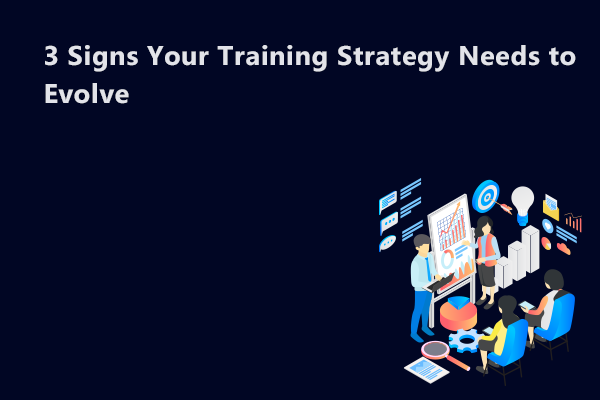
3 Signs Your Training Strategy Needs To Evolve
A skilled workforce is instrumental in helping organizations to survive in these unpredictable times. Despite training employees during onboarding, companies need to promote a continuous learning culture to enable the team to overcome all kinds of challenges.
With the changing times, corporate training programs need to be updated. Do not wait for your employee development programs to become completely ineffective. Keep revamping the training content from time to time to stay relevant.
3 Signs Your Strategy For The Corporate Training Programs Need To Evolve
Start by assessing the current statuses of the corporate training courses and look for the vital signs that denote your training strategy is becoming obsolete. Three signs you need to identify to understand whether it is time to choose a better training program are discussed below in detail.
Sign 1: Still Stuck With Instruction-Based Classroom Training
The e-learning industry has grown massively across the two years of the pandemic and is here to transform employee training and development. However, some companies are still following traditional classroom training that leans on outdated learning materials and methodologies.
1800 leaders across 50+ organizations were surveyed by Leadership IQ on matters related to online training in 2021. These are some of the survey responses:
- Only 20% of organizations have started virtual training.
- 25% of employees still prefer classroom learning
- 56% of employees agreed that socially-distanced classroom training is required.
- 22% of employees were willing to travel for traditional training.
Although classroom training is still not obsolete, it is not a preferred choice anymore among today’s employees. The modern workforce expects to continuously learn, grow and retain more information even after the corporate training programs are over. Using e-learning organizations can provide the benefits of automatic micro-learning and deliver bite-sized refresher content for better knowledge application and retention.
Besides, online training materials are customizable according to the needs of an enterprise. You can conduct a pre-evaluation to understand the training requirements of your team and then include only those modules that are focused on their needs and job role.
Thus, the future of training is to strike a balance between face-to-face and e-learning. This hybrid training approach uses technology and supports in-person learning for better retention and engagement levels.
Sign 2: Fixed Training Schedules Are Still The Rule
In a report published by Harvard Business Review, 88% of today’s employees said they want a flexible work culture and the freedom to work from anywhere rather than from fancy headquarters.
Thus, autonomy and flexibility are valuable expectations of the modern workforce. The same applies to employee training and development as well.
After the pandemic, teams are spread across various time zones and geographical locations, so making people fly in to attend an in-person training session is a hassle that involves time and money loss. It is wise to incorporate online corporate training courses in your organization that allow employees to learn from anywhere in the world, whenever they want to.
Besides, employees are motivated to learn more when they feel empowered and this can be provided by enrolling them in a virtual training program with a flexible schedule. According to a survey conducted by Axonify, the modern workforce asks for:
- Accessibility: 93% of employees ask for training access anytime/ anywhere.
- Flexibility: 87% of employees choose flexible training times that can easily fit into their tight work schedules.
- On-Going Training Opportunities: 82% of employees believe that regular, short training sessions are more effective than formal in-person workplace training.
Flexible learning allows a great degree of freedom and autonomy for a seamless learning experience that enables better knowledge & skill development and retention. Rather than setting up a rigid classroom training schedule, enroll your employees in virtual corporate training programs that give them the flexibility to choose when and where to learn for better engagement.
Sign 3- Lacking Innovation & Technology Upgrades
To explain in brief, if you do not provide training to the modern workforce in the ways they can grasp, they will become disengaged and shift to a competitor.
IBM found that 3 out of 5 employees considered the technological capabilities of an organization before taking up a job. Almost 4 out of 5 employees agreed that better technologies help them perform a task with greater efficiency. Another research revealed that 35% of employees said they would leave their present job if they get an opportunity from a more digitally advanced organization.
In response to this, companies need to buck up and put remote training on their priority list. In this context, it is imperative to set up virtual corporate training courses to deliver training content in the most meaningful way.
Employers need to understand that employees do not learn by listening to classroom lectures for hours or mugging up outdated policies or methods by heart. Engaging the modern workforce through bite-sized, short-form content using interactive videos, quizzes or apps is the future of corporate training.
Final Thoughts
Organizations need to discontinue using outdated training processes and bring innovation in training technologies to stay relevant. Enrolling in online training programs that allow employees to learn from anywhere at any time will engage them and continuously improve their skills. To do this, enroll your team in online customized training programs led by industry experts at LearNow today!
